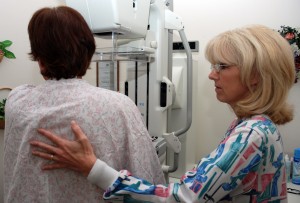A major new study has found that -- in older women -- mammograms done every two years were as effective as mammograms done annually and led to far fewer false positive results.
The study, published online Tuesday in the Journal of the National Cancer Institute, included more than 140,000 women ages 66 to 89 from across the country.
Frequency of mammograms among women in their 40s and 50s has been the subject of intense debate for more than two decades, but this older group of women has been much less studied.
A team led by researchers at UC San Francisco sought to answer the question: among older women, if a woman is screened for breast cancer every two years, instead of every year, will a deadly cancer be missed?
"We found that there really was no difference," Dejana Braithwaite, assistant professor of cancer epidemiology at UCSF and part of the research team, told me. "The women who were screened every two years were not at a greater risk. They did not have a higher probability of being diagnosed with late stage breast cancer compared to those women who were screened every year."
